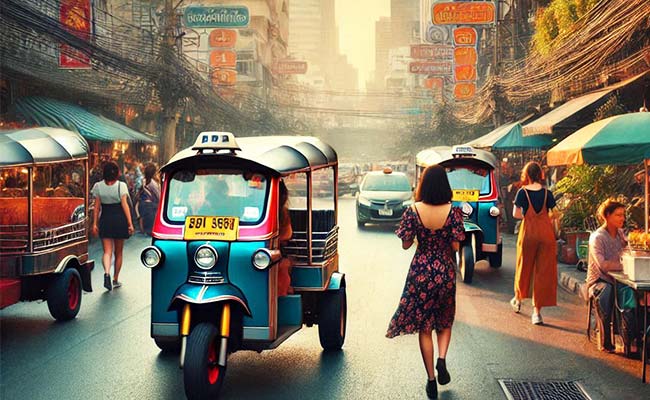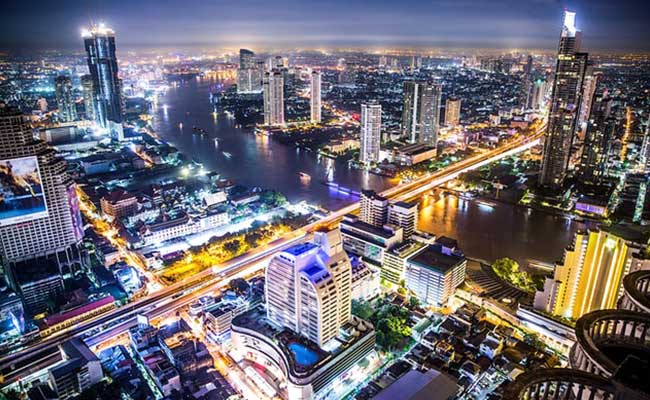Bangkok is a city like no other. Some say that once the city has you, it never lets go. For most who have lived there, it remains an affectionate memory – but it isn't for everyone. Potential retirees must carefully consider their age and the related practicalities of daily life.
From navigating Bangkok's intense heat, traffic, and pollution to ensuring you're well-situated to make friends and enjoy a healthy social life, the following ten key considerations will help ensure a smoother transition into your new life in the city.
By planning ahead and staying informed, you can embrace the dynamic charm of Bangkok while enjoying a comfortable and fulfilling retirement.

1. Mobility and Accessibility
The city’s infrastructure can pose challenges for retirees with mobility issues. Sidewalks are often uneven, obstructed, or poorly maintained, and public buses are generally not accessible to people with disabilities. If you use a wheelchair or walk with an aid, Bangkok will be a challenging place to live.
When choosing accommodation, prioritize modern condominiums with elevators, ramps, and easy access to nearby facilities. Even if you are very mobile now, who knows what the future holds in 5 or 10 years.
Living near a large mall like Terminal 21, Esplanade, or IconSiam can offer convenience and accessibility for shopping and eating under one roof.
2. Healthcare Accessibility
Bangkok is home to world-class healthcare facilities, making it an attractive destination for retirees. Hospitals like Bumrungrad International and Bangkok Hospital are renowned for their high standards and English-speaking staff. However, medical costs can vary, so it’s crucial to invest in comprehensive health insurance that covers both routine and emergency care.
Choosing to live near a reputable hospital provides peace of mind, particularly if you have existing health concerns. Even for less serious issues, such as the flu or a pulled muscle, being close to quality medical care ensures faster and more convenient access. Additionally, consistently using the same hospital enables the staff to become familiar with your medical history, which can lead to more personalized and effective treatment.
You will of course, need medical insurance.
Visiting Thailand? Got Insurance?
I recommend SafetyWing's travel-medical insurance. Their flexible plans are ideal for travelers, digital nomads, and holiday-makers, with low pricing and excellent customer service. Best of all, the claims process is fast and hassle-free. I personally use SafetyWing to cover all my trips.
3. Location
Bangkok is a sprawling metropolis with neighborhoods that vary widely in character, cost, and convenience. Proximity to the BTS (Skytrain) or MRT (subway) is essential for navigating the city efficiently, as Bangkok's traffic congestion can be severe. Even a 10-minute walk in the daytime heat can leave you dripping in sweat, so choose a place to live that is easy to hail a taxi and jump on the Skytrain.
Areas like Sukhumvit, Silom, and Sathorn are highly desirable for retirees due to their connectivity, amenities, and expat-friendly vibe. Quieter suburbs like Bang Na are also worth considering if you prefer a more chilled lifestyle while still staying connected to public transport. Huay Kwang, Thailand Cultural Center, and the Ratchada area in general are also a good shout for very affordable areas with good amenities.
I discuss the best areas of Bangkok to live in this post.
4. Cost of Living
The cost of living in Bangkok is generally cheaper than popular expat locations like Pattaya, Phuket, and Koh Samui, particularly when it comes to everyday expenses. There is more competition in Bangkok, especially in terms of housing and services. This increased competition drives prices down, which can help keep living costs more affordable.
While Bangkok is certainly cheaper compared to many Western cities, the cost can vary greatly depending on your lifestyle. Modern apartments in central areas like Sukhumvit or Sathorn can be quite expensive, especially those in high-demand neighborhoods. In contrast, older apartments or those located in suburban areas like Lasalle tend to be more budget-friendly and can offer a great value for those willing to live a little further from the city center.
Food costs can also be very affordable, particularly if you frequent local markets and street vendors, where a meal can cost just a few dollars. However, dining in Western-style restaurants or purchasing imported goods will quickly increase your expenses. If you prefer these higher-cost options, your overall spending may be closer to what you'd expect in Western countries. To find a balance that works for your budget, it's helpful to track your expenses during your first few months and adjust as necessary to maintain a comfortable and sustainable lifestyle.
5. Friends
While Bangkok is a vibrant 24-hour metropolis, its sheer size and sprawling layout can leave some retirees feeling isolated. Unlike the compact expat communities found in places like Pattaya or the islands, where people live in closer proximity, Bangkok’s population is dispersed across various districts. This can make forming connections and maintaining a sense of community more challenging, especially for newcomers unfamiliar with the city’s social landscape.
Living centrally, in neighborhoods such as Sukhumvit or Silom, can help mitigate these feelings of disconnection. Of course, cafés, gyms, community centers, and bars are where like-minded individuals gather, but retirees must be proactive in creating connections, as Bangkok's fast-paced lifestyle means that social interactions often require effort and planning.
Staying socially active is crucial for a fulfilling retirement. Bangkok has a thriving expat community, with numerous clubs, classes, and meetups that cater to a wide range of interests. From language lessons to hobby groups, there are plenty of opportunities to connect with others. Volunteering with local charities or teaching English can also provide a sense of purpose while contributing to the community.
Joining local expat groups, participating in events, or even enrolling in classes can bridge the gap and help you adopt a sense of belonging in this vast city.
More on avoiding the lonliness trap here.
6. Personal Safety
While Bangkok is considered relatively safe compared to other major cities worldwide, retirees should exercise caution, as you may be more vulnerable to certain risks such as petty theft, scams, or fraud. As we age, we may become more of a target for opportunistic criminals, especially those who prey on the elderly or those not familiar with local customs and risks.
One important measure for personal safety is selecting a condominium or apartment with 24/7 security and keycard access. Many modern developments in central Bangkok offer gated communities, security guards, and surveillance systems, which can provide an added layer of protection. These features can be especially reassuring for retirees, giving peace of mind knowing that access to the building is monitored and restricted.
It's also essential to stay alert and cautious when out in public. Bangkok, like many major cities, has its fair share of scams, which are often targeted at newcomers or tourists. Older adults may be particularly vulnerable to these types of fraud, where scammers exploit their unfamiliarity with the local culture. For example, tuk-tuk rides may be offered at inflated prices or with hidden charges, and bars hosted by ladies of the night may exploit the opportunity to add drinks to your tab.
Retirees should be especially cautious of overly friendly strangers who offer unsolicited help or deals that seem too good to be true, in particular “investment opportunities”, offered in person or unsolicited over the phone. See my article on boiler room scams here.
Lastly, as Bangkok can be very busy, maintaining situational awareness is key, particularly in crowded places such as markets or on public transportation. Carrying a minimal amount of cash, keeping your valuables secure, and avoiding displaying expensive jewelry can further reduce the chances of theft. Consider using a money belt or a secure bag for your essentials.
7. Food and Nutrition
Bangkok is undeniably a food lover’s paradise, boasting everything from street food stalls offering traditional Thai dishes to upscale restaurants serving international cuisine. However, retirees must navigate this culinary abundance with care, especially as age brings additional considerations for maintaining health.
Thai cuisine, while often celebrated for its fresh ingredients and balanced flavors, is frequently heavy in oils, sugar, salt, and fat. Popular dishes like Pad Thai, green curry, or fried rice can be calorie-dense and high in sodium, which may exacerbate conditions like high blood pressure or heart disease if consumed regularly.
The abundance of affordable food in Bangkok also means it’s easy to overindulge, especially when prices are low. For retirees mindful of their weight and overall health, it’s essential to exercise portion control and not over-order just because it's cheap.
While the street food scene in Bangkok is iconic, it requires caution. Food poisoning is a real risk, particularly with dishes involving meat and seafood. It’s best to frequent vendors that are popular with locals and serve freshly prepared food. Avoid stalls where food has been sitting out for extended periods, and consider sticking to cooked dishes to reduce the risk of contamination.
For those with dietary restrictions or health concerns, supermarket chains like Tops and Villa Market provide healthier options. These supermarkets are ideal for sourcing imported goods, and specialty items for Western-style meals.
8. Heat
Bangkok’s tropical climate brings consistently high temperatures year-round, but the heat can feel even more intense due to the city’s unique characteristics. The high population density, combined with the energy output from vehicles, industry, and urban infrastructure, increases ambient temperatures. This phenomenon, often referred to as the urban heat island effect, traps heat and amplifies humidity, making the environment feel much hotter than the actual temperature.
The dense network of buildings and limited green spaces further restrict airflow, compounding the discomfort. Many newcomers underestimate how oppressive this combination can be, especially during peak afternoon hours or in crowded areas.
To stay comfortable, plan your day around the heat. Avoid outdoor activities during the hottest parts of the day, typically from late morning to mid-afternoon. Ensure you stay hydrated, wear lightweight, breathable clothing, and seek shade or air-conditioned spaces whenever possible. Investing in ceiling fans and portable cooling devices for your home can also make a significant difference.
+ Get more tips on coping with the heat
9. Air Quality
Air quality is one of the most significant environmental concerns in Bangkok. Traffic congestion is a constant in the city, and vehicle emissions contribute significantly to pollution levels. This is compounded by industrial activities and occasional smog. Particulate matter levels (PM2.5) can exceed safe limits, posing risks such as respiratory issues, cardiovascular strain, and exacerbation of pre-existing health conditions.
For retirees, particularly those with underlying conditions like asthma, COPD, or heart disease, this air pollution can be a serious concern. Ensuring your home is equipped with effective air conditioning and air purifiers is vital. Modern air purifiers with HEPA filters can significantly reduce indoor air pollution, providing a safe space during days of poor outdoor air quality. Many models now include smart features that monitor real-time air quality, making it easier to adapt to changing conditions.
Outdoor activities can be planned with air quality in mind. Apps like AirVisual, Plume Labs, or local monitoring stations can provide daily updates on pollution levels, allowing you to schedule exercise when air conditions are better. On days when the air quality is particularly bad, consider wearing a high-quality N95 or KN95 mask if venturing outside is unavoidable.
Retirees should also consider the location of their residence in Bangkok. Areas closer to parks or less congested zones may offer slightly better air quality compared to districts near industrial hubs or highways. Additionally, integrating more indoor activities into your routine, such as joining fitness clubs or attending social events in malls or community centers, can help you stay active without compromising your health during smog-heavy periods.
10. Cultural Adaptation
One positive of moving to Bangkok is that it requires relatively less cultural adaptation compared to other parts of Thailand due to its status as a major international city. Many Bangkok residents, particularly in urban and tourist-friendly areas, have some grasp of English, and signs are often displayed in both Thai and English, making it easier to navigate daily life. The city’s cosmopolitan nature means you’ll encounter people from all over the world, which gives rise to a diverse atmosphere.
While understanding and respecting Thai culture remains important, such as observing customs like dressing modestly at temples or refraining from public displays of affection and anger, integrating into Bangkok’s community tends to be more straightforward. Of course, basic Thai phrases can still enhance your experience, but they’re less immediately critical for daily interactions than in rural areas.
Learning Thai, is, of course, still highly recommended for integration during your retirement.
To wrap this up, if you didn't know already you will need a visa to retire in Bangkok, or anywhere in Thailand for that matter. I have a comprehensive retirement visa guide here.
Start with a quick quote here from Cigna. Then you can compare it to other companies. If you are sending money to your loved one, or your own Thai bank account, try Wise here. It is fast and cheap. Me and the majority of my readers are using it. Learning Thai makes life easier, and way more fun. I use Thaipod101. Get a free account by clicking here. It is really easy to use.More Tips for a Better Life in Thailand
Get Good Health Insurance:
Send Money to Thailand:
Improve Your Thai Skills:
Last Updated on



Leave a Reply